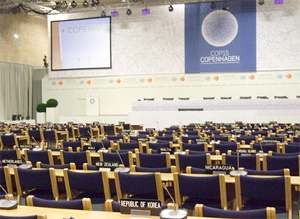by Franck Magennis.
On Tuesday, November 27, delegates at UN climate change negotiations in Doha met for the opening sessions of the Ad-Hoc Working Group on Further Commitments for Annex I Parties under the Kyoto Protocol (AWG-KP). The Protocol currently commits about 40 developed nations, known as the “Annex I Parties,” to an average five percent greenhouse gas reduction from 1990 levels. But these emissions reductions applied only during the first commitment period of the Protocol, which expires at the end of 2012. Agreeing on a second commitment period under the Protocol is seen by many as an important condition for success at the Doha negotiations.
Based on the current positions of the Annex I parties, a second commitment period for the protocol would only include the European Union, Australia and several smaller countries which together account for less than 15 per cent of global emissions. To date, the US, Russia, Canada, Japan and New Zealand have all refused to sign on to a second commitment period.
The US has maintained its position that it will not commit to a binding treaty on reducing greenhouse gas emissions if it excludes the biggest emerging economies or if those countries’ commitments are conditional upon financial support from developed countries. The US, historically the world’s biggest carbon emitter, signed Kyoto Protocol when it was opened for signature in 1998, but later declined to ratify the agreement.
The Japanese delegation defended its decision not to sign onto a Kyoto extension, insisting it would be better to focus on coming to an agreement by 2015 that would require all countries to do their part to keep global temperatures from rising more than two degrees Celsius, compared to preindustrial times. “Only developed countries are legally bound by the Kyoto Protocol and their emissions are only 26 per cent,” said Masahiko Horie, speaking for the Japanese delegation. The New Zealand Government has expressed similar sentiments, arguing that the world would be better served by coming to a new, broader treaty by 2015.
Canada has not only refused to be bound by a second commitment period, but last year announced its decision to withdraw from the Protocol completely. Its withdrawal will become effective on December 15, 2012, a week after the talks in Doha are scheduled to conclude.
Of those Annex I Parties supporting the continuation of the Protocol, the EU stood by an eight-year commitment period and said the period should be seen “as a floor, not as a ceiling.” The 27-nation EU has unilaterally promised to scale back emissions by 20 percent by 2020 compared with 1990 levels, and to extend this to 30 percent if other major polluters follow suit. Australia has also agreed to enter into an eight-year commitment period, and is prepared to reduce its emissions to 5% below 2000 levels, by 2020.
For more information, see:
https://www.brecorder.com/general-news/172/1262169/
https://www.sustainablebusiness.com/index.cfm/go/news.display/id/22934
https://www.cfr.org/climate-change/doha-climate-debate/p29556
https://www.climatecentral.org/news/kyoto-protocol-australia-signs-up-for-second-phase-15224


